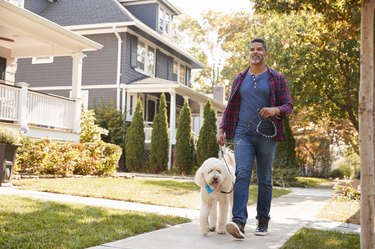
We can all agree that being backed up is miserable. But here's another indisputable fact about poop: Simple behavioral shifts are often enough to relieve constipation and make your bathroom trips more pleasant.
"Lifestyle or habit changes can help manage or prevent bowel issues like constipation," confirms Vanessa Méndez, MD, a board-certified gastroenterologist specializing in digestive disorders.
Video of the Day
Video of the Day
Adjusting your diet, being more active, staying hydrated and even managing your stress can have a major effect on your GI function and support smoother bowel movements.
What's more, you don't have to do everything at once. Small behavior tweaks, made one at a time, can quickly add up to big changes in the bathroom department. (As long as you keep them up, of course.)
Here are seven steps you can take over the course of a week to help you poop better.
Day 1: Do a Carb Swap
Struggling to get the recommended 25 to 30 grams of fiber daily? Too little roughage can contribute to constipation, gas and bloating.
You can get more by trading the white bread on your sandwich for whole-wheat, or snacking on fruit and nuts instead of cookies or chips.
That's because refined carbs like white bread, white pasta and baked goods are low in fiber and high in sugar, which can trigger inflammation in the gut, Dr. Méndez explains.
On the other hand? Complex carbohydrates like whole grains, fruits, veggies and beans are fiber-rich and can feed your microbiome to support optimal gut health, she says.
Keep it up: Once you've mastered one carb swap, try making another switch (and another!) with these fiber-rich foods.
Day 2: Sit on the Toilet at the Same Time Every Morning
The body is often primed to poop shortly after waking, but you have to give it the chance to do so.
"Usually it's easier to have a bowel movement first thing in the morning or after a meal," says Claudia Sanmiguel, MD, gastroenterologist at Providence Saint John's Health Center.
For better, more consistent pooping, slot in toilet time just like you would a regular shower or morning exercise (five to 10 minutes should be plenty).
Keep it up: After a few days of hitting the bathroom at the same time, you might find that you start to have to go on schedule without even thinking about it. But if you're having trouble, find a trigger that helps get things moving. "It may be drinking a cup of coffee, eating a banana or drinking a large glass of water as soon as you wake up," Dr. Sanmiguel says.
Day 3: Drink an Extra Glass of Water
Getting enough fluids causes stool to be softer and bulkier, making it easier to pass (and stopping poop from smelling).
"A good rule of thumb is to get your weight in kilograms in water," Dr. Méndez says.
If you weigh 70 kilograms (about 154 pounds), for example, aim to drink 70 ounces of water daily (adding a little more if you're very active or if the weather is very hot). Another way to think about it is to drink half your body weight in ounces each day. So if you weigh 200 pounds, for example, aim for about 100 ounces.
You can't go wrong with plain H2O, but coffee, tea, milk and water-rich fruits and vegetables (like cucumber or watermelon) can help you reach your goal too, per the Mayo Clinic.
Keep it up: Find simple reminders to help you sip throughout the day. Drink a glass of water every time you walk into the kitchen, for instance, or use a water-tracking app like WaterMinder.
Day 4: Take a 30-Minute Walk

Here's one more reason to strive for the recommended 30 minutes of moderate exercise most days of the week: Moving your body can help move your bowels.
"Sedentary people have more trouble emptying their bowels," Dr. Sanmiguel says. "The longer you sit down, the higher the chances are of developing symptomatic hemorrhoids or constipation."
Aerobic exercise tends to be the most effective for getting things going, and it doesn't have to be intense. A brisk stroll will get the job done, says Dr. Méndez.
Keep it up: Treat your workouts like appointments by putting them into your calendar, so they don't get lost in the shuffle. If you can't find a spare 30 minutes, break your activity into shorter chunks (like three 10-minute walks), recommends the Mayo Clinic.
Day 5: Look at Your Meds
Many medications, vitamins and supplements (including natural ones!) can affect your GI tract, Dr. Sanmiguel notes. Anti-depressants, high blood pressure meds and iron supplements often trigger constipation, for instance, while antibiotics, immunosuppressants and even some herbal teas can cause diarrhea.
Set aside time to review your medication and supplement regimen with your doctor or pharmacist, she recommends. You can work together to figure out a solution for any possible offenders, like lowering your dosage or trying an alternate drug.
Keep it up: Before taking a new medication or supplement, check with your doctor or pharmacist about whether it could affect your bowel habits.
Day 6: Use a Toilet Stool
Getting into a squat-like position, where your knees are above your hips, can make for better pooping by reducing straining and making it easier to go. You can buy a dedicated squatty potty, but simply placing a stool under your feet will do the trick too.
"This 'squatting' position will open up your pelvic angles and rectal passage," Dr. Méndez explains.
You can get more leverage by resting your hands or elbows on your thighs while leaning forward, taking care to keep your spine straight.
Keep it up: Once you've seen the difference a stool can make, chances are you won't want to go back to life without one.
Day 7: Do Something Relaxing
Stress can seriously mess with your stomach, so start taking some time to chill and unwind.
"When the brain perceives stress, it sends signals to the gut that influence digestion, absorption and motility, slowing things down in the form of constipation or speeding them up in the form of diarrhea," Dr. Méndez says. (Thanks, vagus nerve!)
Journaling, meditation, taking a walk or even just calling a friend can all work — as long as you feel cooler and calmer after doing it.
Keep it up: Pick a time of day where you can consistently keep distractions at bay and set aside time for you. That might mean getting up a little earlier to take a short walk before everyone else in your household wakes up, or reading in bed at night instead of scrolling on your phone.
Was this article helpful?
150 Characters Max
0/150
Thank you for sharing!
Thank you for your feedback!
Is this an emergency? If you are experiencing serious medical symptoms, please see the National Library of Medicine’s list of signs you need emergency medical attention or call 911.